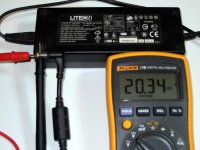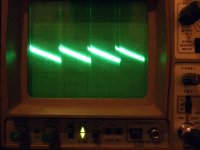My Samsung laptop is noisy with SMPS and quiet when run on battery. And: it is also quiet when I run the SMPS charger through an isolation transformer -just for testing. I have a ground loop. Do you have a bench supply? You could try with that and make an earth connection to test for a ground loop.
Your problem here is a ground loop, I suspect.
Laptops are especially terrible at creating ground loops when they're plugged in. Usually the negative output of the adapter is connected to AC earth ground, and at the laptop itself the negative terminal is connected to the laptop's ground - which in turn is connected to USB grounds, serial port grounds, cable shields, audio ground, etc.
So when the laptop pulls current from the adapter, the resistance of the DC cable and connector end up making the laptop's ground voltage float a few hundred mV above AC earth. Plug another earth-grounded device into the laptop and you create a different return path for the DC power... and a hell of a mess.
There's a few ways to fix this:
- Isolation transformer. Lots of isolation transformers will isolate hot/netural but keep ground connected from input to output - make sure that it's disconnected also.
- Find another 19V laptop adapter with a similar current rating, but with a 2 prong plug. Lots of Dells use these power adapters, but have a custom plug that you'll probably have to cut off and replace with one that matches your laptop.
- Horrible idea I'll probably get told off for suggesting: install a GFI outlet to plug the laptop into, make a big "DANGEROUS DEVICE WHICH VIOLATES LOTS OF CODES, ONLY PLUG THIS INTO A GFI OR YOU MIGHT DIE" sticker for the laptop adapter, and disconnect the AC ground on the adapter by some means (modify the power cord, etc).
Laptops are especially terrible at creating ground loops when they're plugged in. Usually the negative output of the adapter is connected to AC earth ground, and at the laptop itself the negative terminal is connected to the laptop's ground - which in turn is connected to USB grounds, serial port grounds, cable shields, audio ground, etc.
So when the laptop pulls current from the adapter, the resistance of the DC cable and connector end up making the laptop's ground voltage float a few hundred mV above AC earth. Plug another earth-grounded device into the laptop and you create a different return path for the DC power... and a hell of a mess.
There's a few ways to fix this:
- Isolation transformer. Lots of isolation transformers will isolate hot/netural but keep ground connected from input to output - make sure that it's disconnected also.
- Find another 19V laptop adapter with a similar current rating, but with a 2 prong plug. Lots of Dells use these power adapters, but have a custom plug that you'll probably have to cut off and replace with one that matches your laptop.
- Horrible idea I'll probably get told off for suggesting: install a GFI outlet to plug the laptop into, make a big "DANGEROUS DEVICE WHICH VIOLATES LOTS OF CODES, ONLY PLUG THIS INTO A GFI OR YOU MIGHT DIE" sticker for the laptop adapter, and disconnect the AC ground on the adapter by some means (modify the power cord, etc).
Just some warnings about running with the ground disconnected:
(A) PLUG THIS INTO A GFI ONLY. If the AC adapter fails in such a way that live AC becomes connected to the secondary (eg, the main power transformer breaks down due to an AC spike/surge), you can get a potentially bad shock if you touch the secondary. A GFI could save your life in this scenario.
(B) 3 prong devices only have to be single insulated, 2 prong devices have to be double-insulated. Basically a 3 prong device is more likely to malfunction and put AC voltage on its outputs, the scenario described in (A).
(C) 3 prong devices often have MOVs, filtering components, etc. present between hot/neutral and earth ground. If earth ground is disconnected from the wall, these components can cause weak currents to flow into the earth ground and cause grounded surfaces (including the DC output of your charger) to weakly "float" to near 1/2 AC voltage. You probably won't injure yourself, but there's a chance you can damage things when you plug them into the laptop, or damage the laptop itself.
I'd honestly crack the AC adapter open and either remove the ground-referenced filtering/protection bits, or better yet, find a way to separate the DC output ground from the AC earth ground. This will solve (C), but not (B).
Solving (B) requires either an isolation transformer, or replacing the laptop adapter with a 2 prong/double insulated unit as suggested earlier.
(A) PLUG THIS INTO A GFI ONLY. If the AC adapter fails in such a way that live AC becomes connected to the secondary (eg, the main power transformer breaks down due to an AC spike/surge), you can get a potentially bad shock if you touch the secondary. A GFI could save your life in this scenario.
(B) 3 prong devices only have to be single insulated, 2 prong devices have to be double-insulated. Basically a 3 prong device is more likely to malfunction and put AC voltage on its outputs, the scenario described in (A).
(C) 3 prong devices often have MOVs, filtering components, etc. present between hot/neutral and earth ground. If earth ground is disconnected from the wall, these components can cause weak currents to flow into the earth ground and cause grounded surfaces (including the DC output of your charger) to weakly "float" to near 1/2 AC voltage. You probably won't injure yourself, but there's a chance you can damage things when you plug them into the laptop, or damage the laptop itself.
I'd honestly crack the AC adapter open and either remove the ground-referenced filtering/protection bits, or better yet, find a way to separate the DC output ground from the AC earth ground. This will solve (C), but not (B).
Solving (B) requires either an isolation transformer, or replacing the laptop adapter with a 2 prong/double insulated unit as suggested earlier.
I had one such brick around and run a little test. Its one of those that has 2 pin mains plug and inlet. The scope is at 5mV vertical and 2mS horizontal, AC coupled on adapter's output. That PSU's chopped output nature can be seen at the centre of the screen, while the faint spikes occurring at slant edges overscan the scope in every mV range.
Attachments
What's a GFI?
Ground Fault Interrupter
You compromise safety by lifting ground in equipment designed with a mains ground prong. You may electrocute yourself in case of an adapter fault when not hooked up to a properly fault detecting outlet as with GFI. DIYaudio.com does not endorse such practices and carries no responsibility.

- Status
- This old topic is closed. If you want to reopen this topic, contact a moderator using the "Report Post" button.
- Home
- Amplifiers
- Power Supplies
- Linear PSU for laptop

